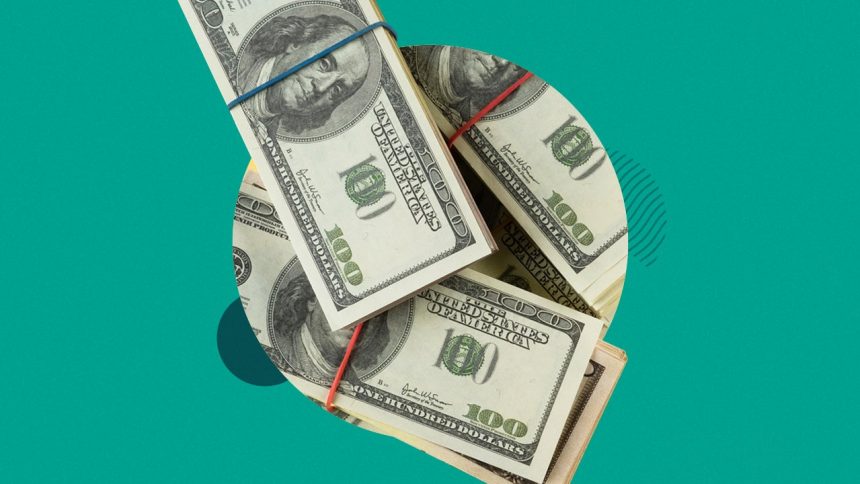Portions of this article were drafted using an in-house natural language generation platform. The article was reviewed, fact-checked and edited by our editorial staff.
Key takeaways
- Consider paying extra when possible, making bi-weekly payments or looking into lender payment programs to pay off your debt faster.
- Paying off debt early comes with benefits, like freedom from monthly payments, saving money on interest and improving your credit score.
- Potential disadvantages to paying off debt early include having less liquidity for investing and possible prepayment penalties.
Paying off debt can be daunting, especially if you have a lot of it. Many people may be tempted to only make the minimum monthly payments to avoid putting too much thought toward it. However, there are many benefits to paying off debt early that should not be overlooked.
Understanding the potential downsides of expediting debt repayment is crucial. If you bite off more than you can chew and get stuck with higher payments than you can afford, it can lead to further debt accrual and credit damage.
How to pay off debt early
Carefully compare each repayment method and review whether your budget can handle the extra commitment until the debt is completely paid off.
If you’re considering paying off debt early, there are a few ways to go about it. You don’t necessarily have to make one giant payment, but you can if that’s best for your finances. However, other repayment methods are less of a shock to your wallet but can still help you pay down your debt faster.
Pay extra when you can
Start by paying more than the minimum amount due each month, but only when you have the extra money to spare. It’s not recommended that you pull from your savings or emergency accounts to make these extra payments, as doing so can put you in a precarious financial position later.
If you were to simply pay the minimum amount each month, you’d technically never pay down your debt. Plus, every time you carry a balance from month to month, interest is accruing. That said, you should aim to make your entire monthly payment to incur less interest and pay off the debt faster.
Who it’s best for:
Those who have only made the minimum payments on their debts.
Make bi-weekly payments instead of monthly
This method isn’t the fastest way to pay off your loans, but it can be more manageable than other methods and help reduce the amount of interest you pay. Over the course of a year, if you’re consistent and switch to a bi-weekly payment plan, you’ll have made the equivalent of one extra payment each year.
While just one more payment may not seem like much, it can have a significant psychological impact on your repayment journey. Even if it’s just a little bit more that you can put toward your debt, seeing your total amount decrease faster can encourage you to keep going and maybe even find some extra cash to throw toward it.
Who it’s best for:
Borrowers who need a psychological boost and have a bit of extra cash at the end of the month.
Look into lender payment programs
Some banks and loan providers offer special programs designed to help borrowers pay off their debt more quickly. Such repayment plans often come with higher monthly payments and shorter terms. That said, payment programs aren’t ideal for everyone. They’re best for those with extra cash who can afford the payments.
Before you look into whether your lender offers a repayment plan or similar option, look through the terms and conditions. It’s not uncommon for lenders to charge additional fees, and some may not allow you to alter your repayment structure once you’re locked into the original payment term. At the end of the day, this method is the most effective if any additional fees or penalties don’t offset the interest saved.
Who it’s best for:
Individuals with a surplus of cash at the end of the month and those whose interest savings aren’t offset by program fees.
5 advantages of paying off debt early
There are several advantages to paying off your debt early, and almost all of them translate into more money in your pocket each month and more financial freedom to address other goals.
1. Freedom from monthly payments
The more bills you have to pay, the more complicated and expensive your financial life can get. No matter how large or small your debt-to-income (DTI) ratio is, if you have different debt streams from multiple servicers and issuers, you can easily get overwhelmed and feel trapped.
As you satisfy each of your debts, you’ll have fewer obligations to meet every month, making it easier to stay organized and focus on your long-term goals. The less debt you have, the more financial and physical freedom you have, as less time is spent organizing and paying for your accounts. Plus, with less going toward bills, the more cash you can accrue each month to do the things you want, like going on that dream vacation, treating yourself to a spa day or buying that gift for a friend or family member you’ve been eyeing.
2. Save money on interest
When you have high-interest debt, such as credit cards or personal loans, it can cost quite a bit just to make minimum monthly payments. In addition, each month you carry a balance on the account, your previous purchases may become more expensive, depending on how interest is calculated.
For example, carrying a balance from month to month on a credit card will cause interest to accrue on your balance. This can cost you hundreds — if no thousands — in interest alone, given the generally high rates that cards come with. With a personal loan, your credit score will be negatively impacted by not making the assigned monthly payment, but interest will accrue for the life of the loan term. So the longer you take to pay it down, the more you’ll eventually pay in interest over time.
For example, if you have a $20,000 personal loan with a five-year term and 7.5 percent APR, the monthly payment would be $401. Over the entire course of the loan, you’d pay a total of $4,046 in interest on top of the monthly payment. However, if you can afford to consistently pay $200 more per month, your total interest for the loan would come out to $2,493 — an overall savings of $1,553.
4. Improve your credit score
Paying off debt decreases your credit utilization ratio, which is the amount of debt you owe relative to your overall available credit. Most lenders and issuers use the FICO credit scoring model to check your credit and determine eligibility. Also known as credit usage, your utilization ratio is responsible for 30 percent of your FICO score.
Paying down your debts each month while reducing the amount you spend through credit is the best way to see your FICO credit score quickly increase. With a better score comes increased lending opportunities and more favorable interest rates in the future.
5. Build your savings
One of the most significant advantages of paying off debt is the spare cash you will now have available to address other financial goals and priorities. Especially during economic turbulence, it’s best to put these funds to good use to secure good financial footing. As you pay off your balances, use the money you would have used for the monthly payments to build emergency funds or increase your savings.
Experts recommend that people typically have between three to six months of emergency savings stored up. Having this money locked away will prevent you from getting stuck in the high-interest debt loop in the case of an unexpected emergency, loss of income or expense.
To make this money even more valuable, grow your savings — and emergency fund — in a high-yield savings account (HYSA). Most lenders offer HYSA’s and differ from the regular savings account you open with your bank or credit union. They offer much higher interest rates on the cash in your account.
Right now, rates are higher than ever for these specific accounts. For example, LendingClub has a return rate of 5.00 percent, while Bank of America and Chase Bank have return rates of 0.01 percent.
4 disadvantages of paying off debt early
In most scenarios, paying down your debt as soon as possible is typically a good idea. But, there are certain situations where putting more money toward it could harm you more than help you down the road.
The following examples are only considered disadvantages in specific scenarios. Namely, if you’re current on all of your debts, they’re all relatively low-interest and if allocating your funds elsewhere will be more beneficial to your future.
1. Less liquidity for investing
If you receive a large sum of money and put it toward your debt, you won’t be able to earn interest on it, like you would if you threw the funds into a retirement account or your HYSA. If your debt is manageable and the interest rates aren’t sky-high, it may be worth investing the extra money.
Keep in mind this is only a disadvantage if your investment returns are more beneficial than paying down debt faster. In all other scenarios, it’s best to focus on paying off your debts as aggressively as possible.
2. Possible prepayment penalties
Some loans have penalties for early repayment, also known as a prepayment penalty. While not every lender or issuer will charge this fee, it’s uncommon to see this listed on a lender’s ‘fees and penalties’ breakdown. Typically the prepayment penalty charges up to 2 percent of the loan’s outstanding balance.
It may be wiser to invest the money or build your savings depending on how large of a payment you’re making and how much of the balance you have left.
3. Lose credit benefits
35 percent of your FICO score is made up of your repayment history. If you regularly miss or are late on payments or contribute to your loan balance in large chunks randomly throughout your term, it’ll negatively impact your score.
Making steady, consistent payments is a sure-fire way to grow your score quickly. If you expedite this process rapidly, you could be hindering your ability to grow your score through positive repayment, especially if your credit history is thin or rocky.
4. You can’t meet your 401(k) match
Similarly to not being able to invest in other accounts, if you cannot meet your employer’s 401(k) percentage match, consider reallocating any extra funds to your retirement accounts. Not contributing up to the match essentially leaves free money on the table.
When you meet your match, your employer is contributing — or matching — that dollar amount. It’s one of the best, if not the best, way to set yourself up for a healthy retirement. You could be doing future you a disservice by depleting your ancillary cash to pay down debt faster rather than meet your match.
The bottom line
Debt can be a major burden on individuals. By paying off debt early, you can experience the freedom of fewer monthly payments, save money on interest, improve your credit score and increase your savings.
Carefully consider your options and potential penalties before paying off debt early. With determination and the right resources, you can achieve financial freedom and live a debt-free life.
Read the full article here
















